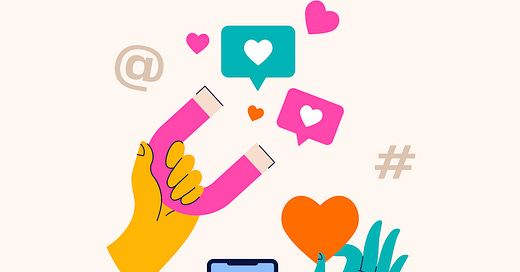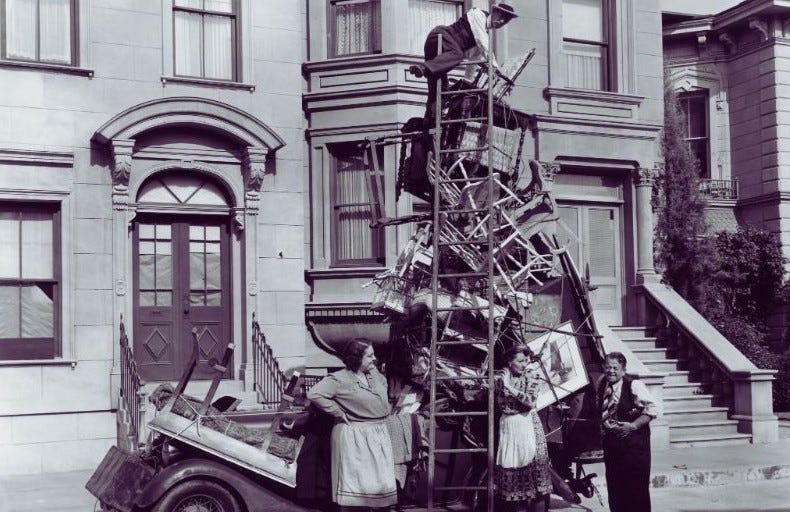New subscribers, likes, and comments and the tiny rush of dopamine
It's hard to stop obsessing.
A few weeks ago, I realized I hadn’t gotten a single email from Substack. It’s the kind of email I love to get, the ones that alert me of new subscribers for Memoir Junkie and Stories About My Bro. I hadn’t thought about this for a hot second because I was feeling frazzled by work, my book, writing classes and assignments, and drafting up new Subtacks posts.
I was working on a newsletter for Memoir Junkie when it hit me. Not one subscriber in weeks? Bah. Boo. I felt… sad.
It made me question what I was doing wrong. And then I thought, why am I doing all this work when it’s crickets on my Substacks? I questioned the topics I chose to write about. I scrutinized everything.
I even brought it up to my sister because it was bothering me so much. I told her maybe I should just focus on the stuff that tends to get the most engagement, which is more marketing-related. Or maybe I should just only share scenes from my memoir like other writers do on their Substacks. I felt stuck.
Then, my Prison Journalism Project story was published and an old colleague of mine messaged me on LinkedIn to tell me he subscribed to Stories About My Brother. That’s strange, I didn’t get an email alert.
I went into my Substack dashboard to check.
Lo and behold, I did get new subscribers. Lots of them. I nearly doubled the number of subscribers on Stories About My Brother and gained another 15 to 20 more on Memoir Junkie!
I went to my emails and looked in the junk folder. There they were. 🫢
The rush of dopamine
At that moment, a tiny surge of satisfaction and gratitude hit me. It’s a familiar feeling that arises each time I get these emails.
You know that feeling. It’s when you constantly check your phone to read emails, when a new love interest texts you back, or when you see a slew of messages and comments after you post something on TikTok.
It is dopamine—a chemical reaction in your brain. Here is an article that better explains this. It’s from The Guardian, titled, Constant craving: How digital media turned us all into dopamine addicts.
This is how the article described this craving:
Rather than giving us pleasure itself, as is commonly thought, dopamine motivates us to do things we think will bring pleasure. As the brain’s major reward and pleasure neurotransmitter, it’s what drives us to seek pizza when we’re hungry and sex when we’re aroused. Scientists use dopamine to measure “the addictive potential of any experience.” The higher the dopamine release, the more addictive the thing.
I don’t think I need this dopamine hit in an extreme way or anything, but after joining Substack, I felt as if the pressure to gain more subscribers and foster engagement were always in the back of my mind.
Substack definitely has pros and cons—on the one hand, the platform allows me to share my work, and people can easily subscribe. Knowing I have an audience motivates me to write and continue sharing.
I love that Substack is all about an engaged audience—it’s why the platform offers features like Notes and engaging in real-time discussions and threads with your readers. It’s why I moved one of my other blogs from WordPress to Substack.
But on the other hand, when I don’t get subscribers and engagement is low, I feel like a failure and like my work sucks. I equated subscribers with validating my work and the level of quality and value.
I knew I wasn’t going down a healthy path and when I recognized it, I made sure to not obsessively check my Substack dashboard, which shows you how many subscribers you have. I didn’t want to make myself feel worse than I already did.
How to not be so obsessive
I didn’t want to fixate on the number of subscribers or any number, for that matter. But I do have to keep track of the performance of my newsletters, so I look at monthly views like I do with my WordPress site. That metric seems to climb much higher and faster than my subscribers, likes, or comments.
In general, though, I make it a point not to check my dashboard very often. I want to treat it like my retirement account—just glance at it once in a while and maybe I’ll be pleased by a slight uplift.
I felt bad about myself when I thought I wasn’t getting any new subscribers for those few weeks. But when I saw all of those new subscribers, I admit felt better, but I hated that I put myself through that in the first place.
I felt so… ridiculous.
Gaining subscribers takes time. One of my favorite writers on Substack,
, regularly writes about this topic. He said he wrote 400 posts before anyone cared.My goal isn’t to get thousands of likes like Alex does. Of course, it would be great!
I just hope my work is good and my readers (you) find value in it. I’m still enjoying the process and find it incredibly meaningful—two things that also matter to me tremendously.
Real-life stuff
Before I discovered that my new subscriber emails from Substack were going into my junk mail, I met up with my cousins for my birthday brunch.
They asked how my book was coming along. I responded with my usual, “It’s been slow.” They said they really liked my stories and my writing on Substack, and I was so touched.
My older cousin, who is also a writer and an incredible artist and creative soul, told me she really enjoys my writing. She has said this to me before, but I brushed off the compliment because I wasn’t sure if she felt obligated to say it because she’s family.
But this time, she had specific reasons why she liked my writing, which indicated that she actually read my stuff. She said she was immersed in each story the whole way through and appreciated that I remove all the “fluff.” I have enough details to keep the stories moving but also leave her curious about certain parts, in a good way. It heightens the tension, she said.
My other cousin, who grew up with my brother because they’re only a year apart, said he read Stories About My Brother in a night, one after the other—and admitted he was slightly drunk when he read them. Call me crazy, but I took that as the highest praise. Drinking and still interested in reading my newsletters? Awesome. 😆
Connections and relationships
After brunch, I felt like my spirit had been lifted.
Being so fixated on the digital hearts and comments and subscribers had made me almost forget there was another facet of engagement that I was not stopping to recognize. Many of my friends subscribe to my newsletters and often reach out to me to tell me they read about the time my dad got shot or when I first visited prison.
The ladies from a conference I attended last year email me regularly to comment on my stories about shame or grief. They open up and tell me about a time they experienced trauma or a life-changing tragedy.
Recently, I even talked on the phone with another Substacker who said he was also working on a book. We talked for nearly 45 minutes and I felt so grateful to have made the connection.
Growing my subscribership and engagement isn’t just about collecting hearts and comments.
Engagement is just about getting my work out there and building relationships. It means I can have a conversation with people IRL too. This newsletter is a reminder for me to not lose sight of that, even when the dopamine rush is gone.
Any thoughts on this topic?
More stories…
I joined Substack 8 months ago. Here's the one thing that helped me grow my email list
How do potential subscribers find me and how do I grow my list? It’s probably something a lot of people wonder when they first join Substack or if they’re thinking about signing up. The way I always thought of it was like this: If I create great content, it’ll kind of just happen. That mindset was both right and wrong. Let me explain.
I got my 72-year old mom on Substack
Today’s newsletter is sort of a follow-up to last week’s, about how to get started with a new project when you’re already so busy. I also think it’s about helping others in your life who may need it (for my mom, it was not knowing how to use Substack).
Doing nothing with your website? Me too. I moved my travel blog to Substack
This week's newsletter is one part about why I moved my travel site and another part about building your marketing efforts through a platform like Substack. I’ve had ClairesHoliday.com since 2017. I started the site after embarking on a year-long desire to travel the world. I quit my job and traveled once a month while I consulted. I started the site to …









I relate on a lot of levels to this tension, this being pulled in so many directions. For years I followed all the advice about setting goals and measuring progress and data this, analytics that. And all those inputs created a kind of blinding vortex where I would work, grinding myself into a pulp just to get to the outcome I said I wanted. It's no wonder I burned out over and over again. The needle was moving all the time, for one thing (very maddening effect that has). And none of this goal setting ever considered ME in the process. I had no real awareness that I was torturing myself until it was way too late (autism makes "registration" of pain really tricky/elusive).
So the fact that you can see the tension and acknowledge it and relate differently because of it — that's basically the whole ball game, as far as I'm concerned. Of course then that leaves us with, "What do we focus on instead if not the numbers, the end goal?" I suppose it's different for everyone, but for me, I try to really sink into the felt sense of every day.
Did my day have the qualities I value, like relaxation, creative excitement, relational connection? If so, then I met my goals. If not, then time to re-evaluate. And I TRY TO only occasionally touch in with the numbers (this is very hard) and imagine some creative tweaks here and there to try to get my writing into new readers' hands. (The numbers are still very sparkly... you can't NOT see them, but I do try to resist the web they cast.) Anyways, long way of saying, I hear you and you're doing great.
Love it! Keep writing! BD